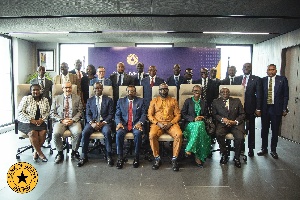Business News of Wednesday, 16 April 2025
Source: www.ghanawebbers.com
Fourth IMF review successful with Board approval set for July
The agreement comes after two weeks of discussions in Accra. IMF staff, led by Mission Chief Stéphane Roudet, met with Ghanaian authorities. They focused on the Ministry of Finance. This successful review is part of efforts to restore macroeconomic stability.
Ghana faced fiscal slippages and reform delays in late 2024. Despite higher-than-expected growth last year, implementation faltered before December's elections. Key challenges included unpaid obligations and high inflation. Reforms in energy and finance were also postponed.
Since January, the new administration has taken bold measures. IMF officials praised these actions for realigning the program's objectives. The government enacted a stronger fiscal framework and raised electricity tariffs. They also tightened monetary policy to control inflation.
Mr. Roudet stated that the new authorities have made significant changes. They adopted a 2025 budget targeting a primary surplus of 1.5 percent of GDP. Audits of payables have also been launched.
Preliminary IMF assessments show a primary fiscal balance deficit of 3.25 percent at end-2024. This is far from the programmed surplus of 0.5 percent due to unbudgeted expenditures. The government will audit payables with help from international firms and the Auditor General.
Finance Minister Cassiel Ato Forson called this review “the most difficult” yet under the current program but remains optimistic about its outcome. He emphasized the government's commitment to fiscal consolidation and structural reforms despite challenges.
To improve fiscal governance, Ghana amended its Public Financial Management Act (PFM). It now includes a debt-to-GDP ratio target of 45 percent by 2035 and an annual primary surplus requirement of 1.5 percent on a commitment basis.
An independent fiscal council will monitor adherence to these targets moving forward. New procurement rules require prior authorization from the Finance Minister for all central government purchases.
Authorities plan to publish a 'PFM Commitment Control Compliance League Table.' This table will rank ministries based on their fiscal discipline.
On monetary policy, the Bank of Ghana raised its benchmark interest rate recently. It is reassessing liquidity operations to control inflation effectively.
Despite recent progress, structural risks remain, especially in the energy sector. The minister acknowledged this burden but noted steps are being taken to address it.
Quarterly tariff adjustments have resumed alongside implementing the Cash Waterfall Mechanism for timely payments to Independent Power Producers.
Other milestones include migrating spending units to the GIFMIS platform ahead of schedule and publishing revenue audit reports by ECG.
These achievements show the administration’s willingness to exceed program targets as Ghana's external position strengthens significantly due to gold exports and rising remittances.
However, success depends on completing debt restructuring efforts with creditors under the G20 Common Framework agreement signed by all parties involved.
Ghana is working on finalizing bilateral agreements with official creditors while negotiations with commercial creditors continue actively.
The IMF emphasized that Ghana must ensure comparable treatment across creditor groups during this process.
Once approved by the Executive Board, Ghana will receive its fifth disbursement under this program, totaling US$2.3 billion from the IMF so far.
Minister Forson pledged personal oversight for implementing all necessary reforms for board approval.
This marks significant progress toward building "the Ghana we want." The current program aims to restore debt sustainability while supporting economic recovery through targeted social spending initiatives.











